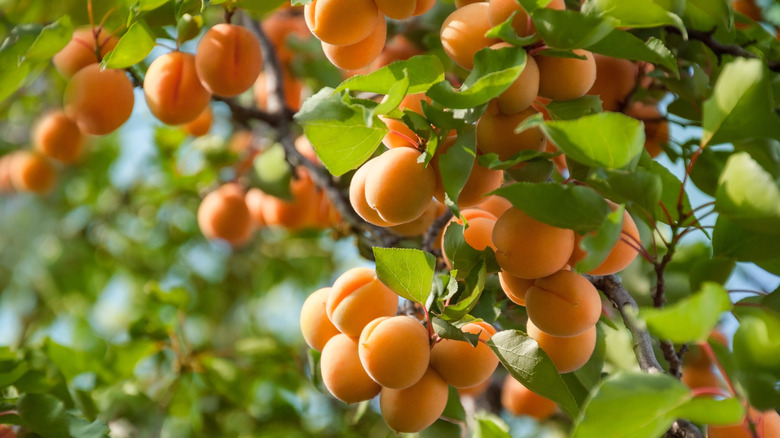How To Prepare Fresh Apricots To Be Stored In The Freezer
If only we could eat our fill of summer stone fruits and not miss them until sunny days return. But it's not easy giving up those luscious, juicy peaches, cherries, mangoes, and plums for months on end, and that goes double for the sweet little apricot. The fruit has its heydays from May through July. Apricots rarely overflow from huge supermarket bins. That's why you want to cherish their tart and honeyed taste every chance you get.
It's sad to see them go when the seasons turn, but you don't actually have to say goodbye, at least if you have a freezer. Since apricots are relatively small, they don't take up much space, and preserving them through the long winter months is fairly easy. It takes a small time investment to properly prepare them for an icy slumber, but the payoff is bites of fruit bursting with flavor and nutrition — not to mention the potential for fireside apricot tarts or brandy-soaked apricots on waffles.
Several approaches can help preserve frozen apricots, such as using ascorbic acid, sugar packs, sugar syrups, and the dry-pack method. They all have pros and cons, so choose whichever one fits your needs. Dry-packing is the least complicated option. It basically involves cutting washed and dried apricots in half, removing the pit in the middle, peeling off the skin, and slicing the fruit into manageable pieces. Lay them out on a parchment-papered sheet pan until frozen, then transfer to a freezer-safe container, removing as much air as possible.
Sweet ways to prep apricots for the freezer
The next two options for freezing stone fruit, including apricots, involve sugar. The first is the sugar-syrup method in which you create a syrup by boiling sugar and water, then pour it over sliced apricots in pint containers, leaving enough room for expansion. The USDA recommends a syrup with a 5:1 ratio of fruit to sugar when freezing apricots. It also notes the option of adding ascorbic acid for color preservation. You could use fruit juice for a more natural sweetener. Either one will likely jeopardize the apricots' fresh-fruit taste and composition, so take that into consideration.
Finally, there's what's known as the sugar pack, an easier method in which you sprinkle sugar directly onto apricots that have been cut, sliced, and peeled. If using ascorbic acid for extra freshness, dissolve it in a small amount of water, and add directly to the apricots before applying the sugar. When the sugar dissolves and the fruit gets juicy, it's ready for the freezer containers. Whichever freezing process you choose, expect them to last up to 12 months before losing quality.

